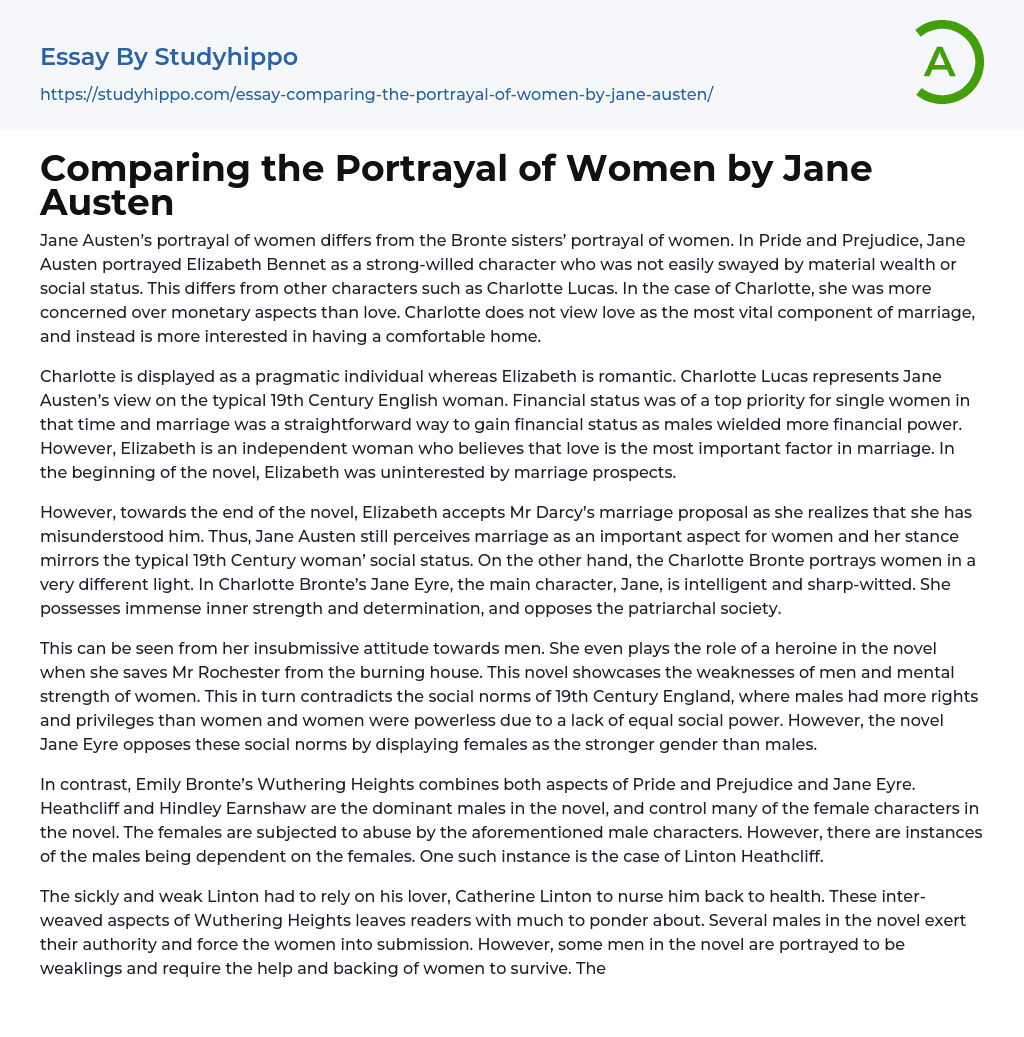

Comparing the Portrayal of Women by Jane Austen Essay Example
Jane Austen’s portrayal of women differs from the Bronte sisters’ portrayal of women. In Pride and Prejudice, Jane Austen portrayed Elizabeth Bennet as a strong-willed character who was not easily swayed by material wealth or social status. This differs from other characters such as Charlotte Lucas. In the case of Charlotte, she was more concerned over monetary aspects than love. Charlotte does not view love as the most vital component of marriage, and instead is more interested in having a comfortable home.
Charlotte is displayed as a pragmatic individual whereas Elizabeth is romantic. Charlotte Lucas represents Jane Austen’s view on the typical 19th Century English woman. Financial status was of a top priority for single women in that time and marriage was a straightforward way to gain financial status as males wielded more financial power. Ho
...wever, Elizabeth is an independent woman who believes that love is the most important factor in marriage. In the beginning of the novel, Elizabeth was uninterested by marriage prospects.
However, towards the end of the novel, Elizabeth accepts Mr Darcy’s marriage proposal as she realizes that she has misunderstood him. Thus, Jane Austen still perceives marriage as an important aspect for women and her stance mirrors the typical 19th Century woman’ social status. On the other hand, the Charlotte Bronte portrays women in a very different light. In Charlotte Bronte’s Jane Eyre, the main character, Jane, is intelligent and sharp-witted. She possesses immense inner strength and determination, and opposes the patriarchal society.
This can be seen from her insubmissive attitude towards men. She even plays the role of a heroine in the novel when sh
saves Mr Rochester from the burning house. This novel showcases the weaknesses of men and mental strength of women. This in turn contradicts the social norms of 19th Century England, where males had more rights and privileges than women and women were powerless due to a lack of equal social power. However, the novel Jane Eyre opposes these social norms by displaying females as the stronger gender than males.
In contrast, Emily Bronte’s Wuthering Heights combines both aspects of Pride and Prejudice and Jane Eyre. Heathcliff and Hindley Earnshaw are the dominant males in the novel, and control many of the female characters in the novel. The females are subjected to abuse by the aforementioned male characters. However, there are instances of the males being dependent on the females. One such instance is the case of Linton Heathcliff.
The sickly and weak Linton had to rely on his lover, Catherine Linton to nurse him back to health. These inter-weaved aspects of Wuthering Heights leaves readers with much to ponder about. Several males in the novel exert their authority and force the women into submission. However, some men in the novel are portrayed to be weaklings and require the help and backing of women to survive. These contrasting displays of gender roles in the single novel brings out the gender roles in Pride and Prejudice as well as the gender roles in Jane Eyre.
- Aldous Huxley essays
- Alice Walker essays
- Amy tan essays
- Anne Bradstreet essays
- Anton Chekhov essays
- Arthur Miller essays
- Augustine essays
- Bertolt Brecht essays
- Booker T Washington essays
- Carol ann duffy essays
- Charles Dickens essays
- Charlotte Perkins Gilman essays
- Chinua Achebe essays
- Christina Rossetti essays
- Consider The Lobster essays
- Edgar Allan Poe essays
- Elizabeth Bishop essays
- Emily Dickinson essays
- Ernest Hemingway essays
- F. Scott Fitzgerald essays
- George Orwell essays
- Harper Lee essays
- Homer essays
- James Baldwin essays
- Jane Austen essays
- John Donne essays
- John Steinbeck essays
- Kate Chopin essays
- Kurt Vonnegut essays
- Langston Hughes essays
- Leonardo Da Vinci essays
- Mark Twain essays
- Mary Shelley essays
- Maya Angelou essays
- Nathaniel Hawthorne essays
- Oscar Wilde essays
- Percy Bysshe Shelley essays
- Peter Skrzynecki essays
- Phillis Wheatley essays
- Poets essays
- Ralph Waldo Emerson essays
- Ray Bradbury essays
- Richard Rodriguez essays
- Robert Browning essays
- Robert Frost essays
- Robert Louis Stevenson essays
- Seamus Heaney essays
- Sherman Alexie essays
- Sophocles essays
- Stephen King essays



